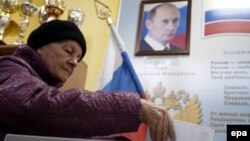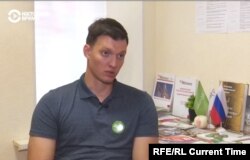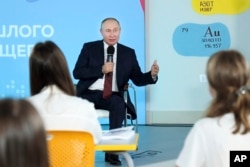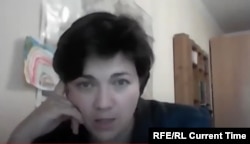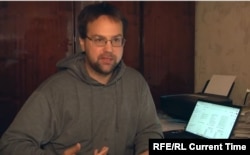For thousands of Russian public school teachers, the September 1 start of the school year meant not only preparing for students, but, also, preparing for hosting polling stations in the country’s September 17-19, 2021 parliamentary and regional elections.
Russia’s government-funded K-12 schools account for most of its 97,000 polling stations, according to the Central Election Commission. For decades, teachers have been asked to serve on the election commission for their schools' polling stations, and expected not to buck the ruling party.
But some teachers resist their supervisors’ expectations -- even at the cost of their jobs.
“They asked me, ‘How do you relate to United Russia?’,” recounted Aleksandr Ryabchuk, a two-time Teacher of the Year who lives in the southern Russian city of Rostov-on-Don (Rostov-na-Donu). “I said, ‘Quite negatively.’ To this I was told, ‘OK, you won’t be part of the election commission.’”
In Russia’s last parliamentary elections, in 2016, nearly 59 percent of the vote in Rostov-on-Don went to the ruling United Russia party. Trailing far behind, the Communist Party of the Russian Federation finished second with 13.6 percent of the vote.
Ryabchuk, a former natural history teacher at Rostov-on-Don’s Lyceum No. 11 and at a private school, is an open supporter of jailed opposition leader Aleksei Navalny. He lost both of his full-time jobs after participating in a January 23 pro-Navalny rally.
Ryabchuk alleged that both schools had told him he could keep his positions only if he stopped showing his opposition sympathies publicly. Critical remarks he had posted on social media about Russia’s political situation prompted these decisions, he believes.
Ryabchuk subsequently resigned, going on to spend 5 days in jail for participating in the unauthorized rally for Navalny’s release from prison. He now works as a private tutor.
“I could have already been the school’s principal,” the instructor, who is in his early 30s, claimed in apparent reference to Lyceum No. 11. “But for this, you need to deliver results at the elections. If you don’t supply results in the elections [for United Russia] in Rostov-on-Don, they can remove you from your job.”
Neither his former employers, nor the Rostov-on-Don education department appear to have commented publicly on Ryabchuk’s departure or his allegations.
But allegations about Russian school principals and government officials expecting public schoolteachers to back the ruling party in an election year are not a novelty.
In 2016, international observers from the Organization for Security and Cooperation in Europe (OSCE) pinpointed this vulnerability in the Russian election system.
Senior city officials chairing election commissions may select as precinct commission heads and secretaries “teachers or civil servants, who are directly or indirectly subordinate to [the] municipal administration,” the observers wrote.
Such connections “may affect the independence of election commissions’ activities and be perceived as influencing their work, thus undermining public confidence in their impartiality,” the OSCE mission found.
This criticism did not appear to faze the ruling party, however. In 2016, United Russia was seen campaigning in schools in Moscow, the southern city of Krasnodar, and handing out “school material” with its logo, the observers added.
This August, the party’s parliamentary deputies, together with local parents’ associations, inspected public schools to “verify” that they were ready for the return to classes. The party also has begun to run its own school buses.
Nonetheless, Central Election Commission Chairwoman Ella Pamfilova has pledged that Russia’s vote will be transparent, fair, and in accordance with the law. In a 2018 interview with the state-run news agency TASS, she categorically denounced the use of teachers and other government employees to falsify vote results.
Yelena Moiseyeva, the former principal of School No. 24 in the Volga River city of Nizhny Novgorod, however, maintains the problem persists.
The educator, in her mid-40s, has become a lodestar for independent Russian media stories covering alleged election-year pressure campaigns on Russian public schoolteachers.
Moiseyeva claims she was fired from her position in late June 2021 for not being willing to organize the vote in her school to favor the ruling party. No official reason was reportedly given, other than “a decision by an executive organ.”
“We all understand that teachers are like soldiers in this story. They always sacrifice soldiers,” she said of her dismissal. “No one will come to help you.”
In response, Moiseyeva filed a lawsuit in July against the city of Nizhny Novgorod for allegedly firing her for political reasons. City officials have avoided discussing the matter, the daily Kommersant reported.
Ryabchuk also opted to try and help himself, though not via a lawsuit. He is running for the Duma as a candidate for the opposition party Yabloko (Apple), which wants to end public schoolteachers working on polling station commissions.
“I’m standing up for teachers being freed from unnecessary burdens, so that there won’t be teachers on [election] commissions, but, as was intended, representatives of all political parties,” Rybachuk said.
Teachers on polling station election commissions can receive payments for their work. In northern Russia, in the Nenetsk Autonomous District, they can earn the equivalent of a monthly salary -- 44,000 rubles (just over $603) -- for just several days of work. Such payments are often cited as potential incentives to go along with vote fraud.
Boris Romanov, a St. Petersburg teacher and long-time election observer, cautions that many public schoolteachers do not grasp the consequences of falsified voting. Rather, their prevailing concern is to avoid conflict with their schools and government officials, he alleged.
Stanislav Andreichuk, the deputy chairman of the voter-rights movement Golos (Vote), agrees.
“Those who take part in falsification can do this under pressure or for money. Or one of the motivations can be that they think it’s the right thing to do,” Andreichuk said.
Romanov, who is running for St. Petersburg’s legislative assembly, terms teachers serving on the election commission for their school’s polling station “a concealed administrative resource,” and opposes the practice.
If polling stations remain in schools, Romanov asserted, they should be run like Russia’s standardized university admission tests. “[T]o eliminate nepotism, clannishness,” teachers from a school hosting a testing site cannot conduct these tests, he noted.
But, so far, national support for preventing teachers from sitting on election commissions appears thin.
In 2019, during Russia’s combative local elections, a 150-member union of Moscow public schoolteachers, Uchitel (Teacher), refused to serve on election commissions in their schools’ polling stations.
The union stated that these commissions often rejected the voter signatures gathered by independents to register as candidates "on far-fetched and false grounds, and often for no reason at all,” Interfax reported.
But support for the measure never spread to the federal level.
Election commissions at school polling stations are not the only danger area for public schoolteachers cited by critics. Теаchers themselves are reportedly routinely ordered to mobilize the parents of their students to vote.
However, Golos’ Andreichuk claims that this system has begun to fail. Turnout in Moscow’s 2019 and 2014 city elections, for instance, stayed largely unchanged, at around only 21 percent, but, in 2019, opposition candidates won 20 of the city council’s 45 seats.
“Either those who were mobilized [by state employees to vote] just didn’t go, or they came and voted, but not the way it was done earlier,” commented Andreichuk.
But ex-principal Yelena Moiseyeva is skeptical about the chances for ending public schoolteachers’ role in Russia’s elections.
“Unfortunately, the best of the best mostly don’t go into this profession,” she said. “All the rest have grown accustomed to [their role on election commissions] and live according to the principle of [avoiding conflict].”




